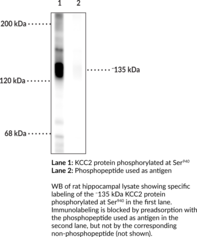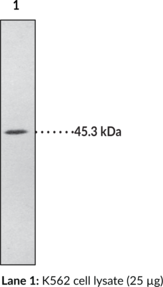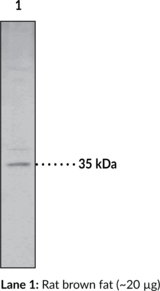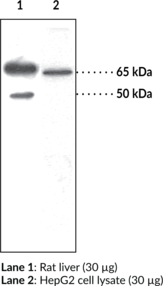Description
The neuronal-specific potassium chloride cotransporter 2 (KCC2) is a member of the SLC12 family of transporters and is encoded by SLC12A5 in humans.{55121} KCC2 is expressed in mature neurons throughout the CNS and localizes to the soma and dendrite plasma membrane where it mediates chloride ion efflux, maintaining the transmembrane chloride potential.{55122} It consists of 12 transmembrane helices, which contain an extracellular loop subject to N-glycosylation, as well as intracellular N- and C-terminal domains with sites that are subject to phosphorylation. Phosphorylation of KCC2 at serine 940 (Ser940) is mediated by PKC and regulates KCC2 stability and expression.{55121,55123} KCC2 (phospho-Ser940) levels are increased by the PKC activator phorbol 12-myristate 13-acetate (PMA; Item No. 10008014) in primary rat embryonic hippocampal neurons.{55123} HEK293 cells expressing a point mutation of Ser940 (S940A) in KCC2, which abolishes its phosphorylation, have a reduced rate of ion transport and decreased KCC2 endocytosis. Mice expressing S940A have reduced latency to first seizure and increased mortality in a mouse model of status epilepticus induced by kainate.{55124} Cayman’s KCC2 (Phospho-Ser940) Polyclonal Antibody can be used for Western blot (WB) applications. The antibody recognizes KCC2 (Phospho-Ser940) at approximately 135 kDa from mouse and rat samples.
Synonyms: Electroneutral Potassium Chloride Cotransporter 2|Neuronal Potassium Chloride Cotransporter
Immunogen: Phosphopeptide corresponding to amino acid residues surrounding the phospho-Ser940 of rat KCC2
Formulation: 100 µl of affinity-purified rabbit polyclonal antibody
Isotype:
Applications: WB
Origin:
Stability: 365 days
Application|Western Blot||Product Type|Antibodies|Polyclonal Antibodies||Research Area|Neuroscience|Seizure Disorders




